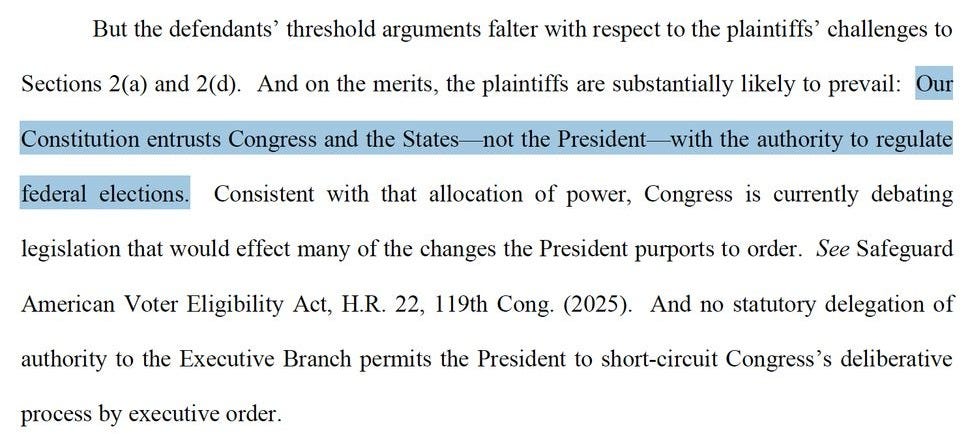|
 |
Apparently, Trump wasn’t kidding when he told people 2024 was the last election they’d ever have to vote in if he won.
On March 25, 2025, he issued an executive order—“PRESERVING AND PROTECTING THE INTEGRITY OF AMERICAN ELECTIONS”—that is a vehicle for making it more difficult for people the Republican Party apparently thinks won’t vote for them to vote. It’s the culmination of decades of voter suppression work, a wish list of measures designed to make it harder to vote, signed off on in the Oval Office, the same place where the Voting Rights Act of 1965 was signed. Trump’s EO went beyond even the Save Act.
Today, a federal judge put substantial portions of that executive order on pause in League of Women Voters et.al. v. Trump. The rationale: presidents don't have the authority to regulate federal elections. Judge Colleen Kollar-Kotelly, a senior judge in the District of Columbia, issued a preliminary injunction that will prevent key parts of the executive order from going into effect while the litigation moves forward. Her opinion, 120 pages of it, is a careful exposition of the flaws in the EO.
As we’ve discussed in other cases, district judges frequently write detailed opinions like this one when they want to make sure there is a solid basis for the courts of appeals to affirm their decisions and as little room as possible for them to reverse. This is a detailed, well justified explanation that will not be easy for an appellate court to dismiss, and it’s not one-sided; it denies some of the relief the plaintiffs requested on technical legal grounds. If you’re so inclined, there’s a master class on what the Framers of the Constitution intended and how our voting infrastructure developed beginning on page 9 that you may enjoy reading. And, Judge Kollar-Kotelly starts with the basics, explaining what executive orders can and cannot be used for. A president, she writes, “cannot make new law or devise new authority for himself—by executive order or otherwise. He may only wield those powers granted to him by Congress or by the Constitution.”
Chief among the measures the Judge disallowed was the requirement that voters provide proof of citizenship before they register or update their registration to vote. Trump wanted to force the Election Assistance Commission to change its forms and make voters comply with this requirement, but the court said no. The reason our elections, which are held in all 50 states and over 3,100 counties, as well as in some territories and for military members and citizens abroad, are not consigned to the control of the president is fairly obvious. The decentralization makes it more difficult for a president or his party to manipulate outcomes in national elections. Trump is nothing if not transparent in this regard.
The executive order would have required people to present a passport, a Real ID, a military identification card, or another government-issued ID that indicates U.S. citizenship when registering to vote. But as we’ve noted before:
At least 21 million Americans don’t have that kind of proof readily available.
Only 51 percent of Americans have passports, which cost adults applying for the first time a $165.00 fee, not to mention assembling the documents you need, getting a photograph of yourself, and making it to an appointment.
The problem is especially acute for young people and students who live away from home, and whose documents at with their parents, if they have them at all.
So why do it? The only rationale offered, voter fraud, is something that has been proven, over and over, not to be a problem, especially in federal elections. It’s the same tired excuse used to make it more difficult for “certain” qualified voters to exercise their rights.
Today’s decision involves three cases, one filed by the Democratic Party and two by nonpartisan groups. The cases were combined because they all stem from issuance of the executive order.
Presidents do not get to dictate the rules in our elections. Today a federal judge reminded Donald Trump that he is not a dictator—not yet, and not ever if federal district judges across the country are permitted to continue doing their jobs.
A decision like this should be a foregone conclusion at the end of this case. No president should try to usurp the power to control elections, let alone be able to do so. The executive order and the lawsuits challenging it underscore just how off the rails Trump is. Every day, part of the spectacle of Trump is his assumption of the role of an autocrat at the expense of the American presidency. And the risk is that it all becomes somehow normalized.
That’s the most important thing for us to push back on right now. American presidents don’t offer themselves up for dinner to the highest bidders, as Trump has done to make money off of his meme coin. They don’t make paper-thin excuses for violating court orders, as this administration is doing in multiple deportation cases. They don’t try to shutter services Americans rely on, like access to Social Security employees for help sorting out benefits or testing milk for safety. Don’t let any of it become normal, not even for a second.
Thanks for supporting Civil Discourse. Your paid subscriptions make the newsletter possible!
We’re in this together,
Joyce
If you’ve been meaning to pre-order my book, Giving Up Is Unforgivable, due out October 21, Barnes & Noble Rewards and Premium Members get 25% off pre-orders through April 25th. Premium Members get an additional 10% off!
You're currently a free subscriber to Civil Discourse with Joyce Vance . For the full experience, upgrade your subscription.
